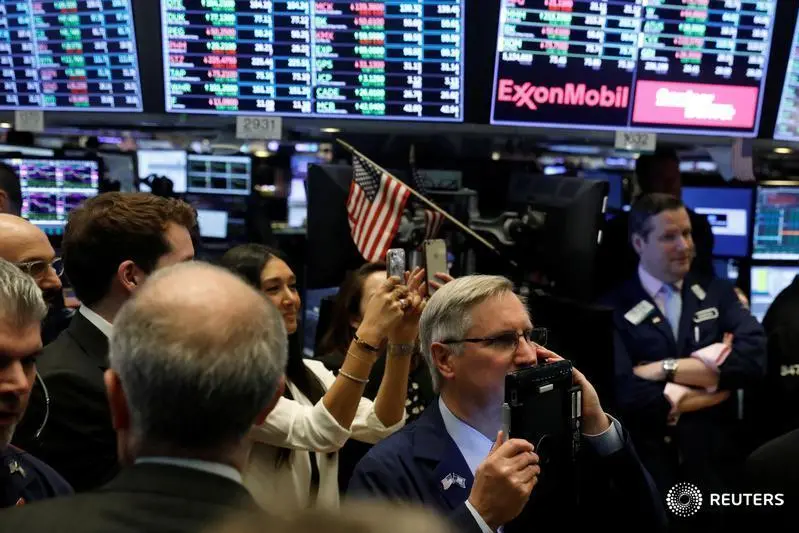PHOTO
Global markets
Asian stocks recovered from earlier losses on Wednesday, but fears of a global trade war and continued tension between the United States and China, seem to cap gains.
Japan's Nikkei was 0.1 percent higher, while South Korea's KOSPI gained 1 percent. In China, the Shanghai Composite Index lost 0.3 percent in early trade.
S&P 500 futures ESc1 ended flat after the main U.S. indices closed lower on Tuesday.
“U.S.-China trade frictions remain broadly negative for the market and for investor sentiment, and are likely to weigh on forward earnings given the ongoing uncertainties coupled with a high base effect when compared with last year’s performance,” Raymond Ma, portfolio manager at Fidelity International, told Reuters.
The U.S. had threatened on Monday to introduce a 10 percent tariff on $200 billion of Chinese goods after China decided to increase tariffs on $50 billion of U.S. goods.


The U.S. threatened to introduce a 10 percent tariff on $200 billion of Chinese goods after China decided to increase tariffs on $50 billion of U.S. goods
Gain a deeper understanding of financial markets through Thomson Reuters Eikon.
Middle East markets
Global index compiler MSCI will today announce the results of its Annual Market Classification Review at around 2030 GMT. The index compiler is considering including Saudi Arabia in its emerging market indexes. Around $1.7 trillion of active and passive money is benchmarked against the widely tracked emerging market indexes.
The United Arab Emirates’ main indices ended lower on Tuesday as global trade tensions weighed down emerging markets, with both Dubai and Abu Dhabi indices posting losses of 1.5 and 0.6 percent respectively. Dubai’s main index was dragged down by property and banking shares, as Emaar Properties dropped 5.2 percent amid forecasts of weak real estate prices driven by excess supply.
Two Dubai lenders Emirates NBD and Dubai Islamic Bank and Emirates NBD lost 0.8 percent and 1 percent respectively, while the UAE’s largest lender First Abu Dhabi Bank (FAB) declined by 0.8 percent. Abu Dhabi’s index was also under pressure of weaker energy stocks as Abu Dhabi National Energy Company (TAQA) plunged 4.1 percent with lower oil prices on escalating trade disputes.
Half of Gulf stock markets, Saudi Arabia, Bahrain and Qatar were still closed on Tuesday as part of Eid holidays. The rest of GCC markets declined on Tuesday, with Kuwait falling 0.4 percent and Oman declining 0.2 percent.
Commodities
Disagreement within the Organization of the Petroleum Exporting Countries (OPEC), especially after Tehran said that it is unlikely that the oil cartel will reach a deal on output this week, along with growing trade uncertainties, are expected to weigh on the oil prices on Wednesday, ANZ analysts told Reuters. U.S. crude CLc1 gained 0.4 percent to reach $65.31 a barrel.
Gold ended flat after hitting near six-month lows Tuesday buoyed by strong U.S. currency. Spot gold traded at $1274.50 per ounce.
Currencies
The U.S. currency was flat against the yen, gaining 0.07 percent against it to 110.12 JPY. The euro was slightly lower at $1.1581, while the dollar index, which tracks the U.S. currency against a basket of major currencies, edged slightly lower to 95.040.
(Writing Nada Al Rifai; Editing by Shane McGinley)
(nada.rifai@thomsonreuters.com)
A new version of the Trading Middle East newsletter is being launched on June 27, 2018. To keep receiving the newsletter after this date, please subscribe using this link.
Our Standards: The Thomson Reuters Trust Principles
Disclaimer: This article is provided for informational purposes only. The content does not provide tax, legal or investment advice or opinion regarding the suitability, value or profitability of any particular security, portfolio or investment strategy. Read our full disclaimer policy here.
© ZAWYA 2018





















